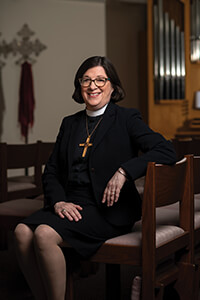Fear not
August 31, 2018
I’m leaving for my first trip to Holden Village, a retreat center near Chelan, Wash. I’ve heard about this Lutheran Shangri-La for years. I have sung and played the Holden Evening Prayer in many settings. I’m excited. The theme verse for the week I’ll be in residence is “Fear not,” which is part of a longer passage found in the book of Isaiah.
For me, Isaiah 43:1-7 is one of the most hopeful and lovely passages in all of Scripture. This word of promise and grace comes to the people of God who are in exile in Babylon. It is difficult for many of us to imagine the intensity of these words and of the promise they contain. God’s declaration that “you are mine … you are precious … and I love you” is almost too good to be true. Hearing and trusting this promise, the people were undoubtedly, as Zechariah says, “prisoners of hope.”
“Fear not.” “Do not fear.” “Do not be afraid.” “The fear of the Lord is the beginning of wisdom.” “You are to fear and love the Lord so that ….” What about all this fear? I think the notion of fearing a loving God is confusing. How can fear, which feels oppressive, be part of God’s life-giving relationship with us? Are we to fear, or fear not? And yet, there it is. In Scripture and in the catechism, we are told to “fear and love God.” We are also told “fear not.” I think both are possible.
There is a lot of fear going around in our world, our country and our church. The evidence is all around: heavily armed police and military personnel at airports; the strident fearmongering that blares at us from media outlets of the left and the right; the possibility of nuclear war; even manufactured threats about personal hygiene (do we have the whitest, brightest teeth?).
This kind of fear makes the world seem chaotic and overwhelming. It drives us into smaller and smaller relationships. It’s limiting and inhibiting. This kind of fear plays to our sinful nature, particularly sin as defined by Martin Luther: “the soul curved in upon itself.” This kind of fear puts us in the center of a limited universe that is restricting and life-destroying. That is why this kind of fear is an effective means of control.
The fear of God that is found in Scripture and the catechism is the opposite. The fear of God is actually part of an expansive and expanding existence. Instead of our crowded little worlds with us at the center, we are able to experience the depth and breadth of God’s love. This kind of fear is about awe that makes us tremble in the presence of God’s power expressed in love. The absence of fear and awe makes God, the cosmos and the world small, impoverished and parochial.
Here is how I think it is possible for us to fear and fear not. If we fear and love God, if we assume an attitude of awe, we are set free. Rather than being limiting, this kind of fear is liberating. We are liberated from futile attempts to save ourselves. We are liberated from exhausting attempts to justify ourselves. This kind of fear is the best response to the constricting and life-destroying fear that the world peddles. It is not denying that the world can be a frightening and dangerous place. Rather, the fear and awe of God make it possible to face real threats with the confidence that this is God’s world—God’s redeemed world.
Listen to God’s promise: “When you pass through the waters, I will be with you; and through the rivers, they shall not overwhelm you; when you walk through fire you shall not be burned, and the flame shall not consume you. For I am the Lord your God, the Holy One of Israel, your Savior” (Isaiah 43:2-3).


